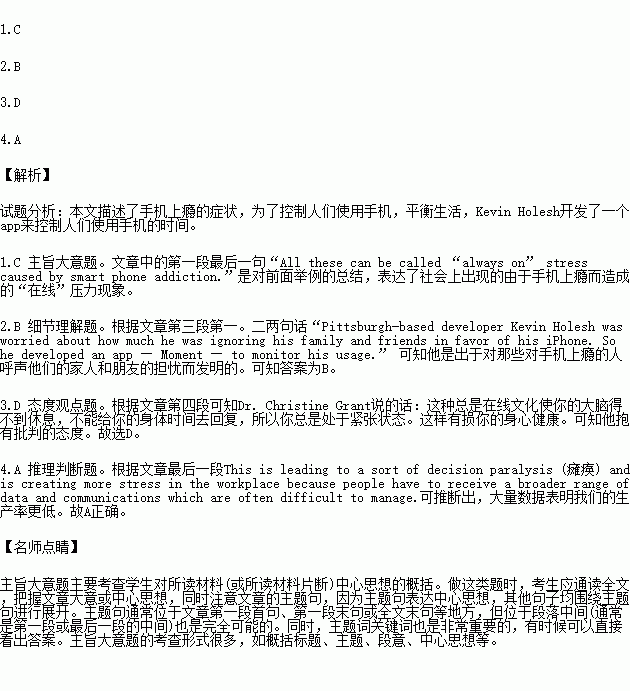题目内容
You get anxious if there’s no wi-fi in the hotel or mobile phone signal up the mountain. You feel upset if your phone is getting low on power and you secretly worry things will go wrong at work if you’re not there. All these can be called “always on” stress caused by smart phone addiction.
For some people, smart phones have set them free from the nine-to-five work. Flexible working has given them more control over their working lives and enabled them to spend more time with their friends and families. For many others though, smart phones have become cruel masters in their pockets, never allowing them to turn them off and relax.
Pittsburgh-based developer Kevin Holesh was worried about how much he was ignoring his family and friends in favor of his iPhone. So he developed an app — Moment — to monitor his usage. The app enables users to see how much time they’re spending on the device and set up warnings if the usage limits are broken. “Moment’s goal is to promote balance in your life,” his website explains. “Some time on your phone, some time off it enjoying your loving family and friends around you.”
Dr. Christine Grant, an occupational psychologist at Coventry University, said, “The effects of this ‘always on’ culture are that your mind is never resting, and you’re not giving your body time to recover, so you’re always stressed. And the more tired and stressed we get, the more mistakes we make. Physical and mental health can suffer.”
And as the number of connected smart phones is increasing, so is the amount of data. This is leading to a sort of decision paralysis (瘫痪) and is creating more stress in the workplace because people have to receive a broader range of data and communications which are often difficult to manage. “It actually makes it more difficult to make decisions and many do less because they’re controlled by it all and feel they can never escape the office,” said Dr. Christine Grant.
1.What’s the first paragraph mainly about?
A. The popularity of smart phones.
B. The progress of modern technology.
C. The signs of “always on” stress.
D. The solutions of smart phone addiction.
2. Kevin Holesh developed Moment to __________.
A. research how people use their mobile phones
B. help people control their use of mobile phones
C. make people better use mobile phones
D. increase the fun of using mobile phones
3.What’s Dr. Christine Grant’s attitude towards “always on” culture?
A. Confused. B. Positive.
C. Doubtful. D. Critical.
4. According to the last paragraph, a greater amount of data means __________.
A. we will become less productive
B. we can make a decision more quickly
C. we will be equipped with more knowledge
D. we can work more effectively

